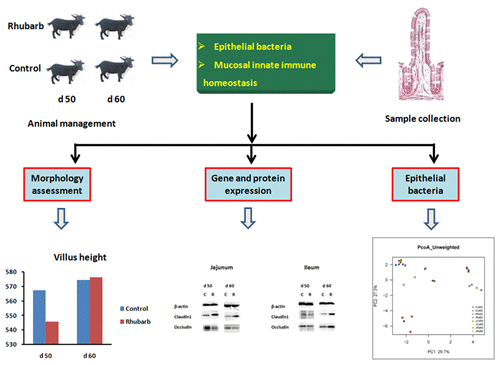当前位置:
X-MOL 学术
›
J. Agric. Food Chem.
›
论文详情
Our official English website, www.x-mol.net, welcomes your
feedback! (Note: you will need to create a separate account there.)
Rhubarb Supplementation Promotes Intestinal Mucosal Innate Immune Homeostasis through Modulating Intestinal Epithelial Microbiota in Goat Kids
Journal of Agricultural and Food Chemistry ( IF 5.7 ) Pub Date : 2018-01-23 00:00:00 , DOI: 10.1021/acs.jafc.7b05297 Jinzhen Jiao 1, 2 , Jian Wu 1, 3 , Min Wang 1, 2 , Chuanshe Zhou 1, 2 , Rongzhen Zhong 4 , Zhiliang Tan 1, 2
Journal of Agricultural and Food Chemistry ( IF 5.7 ) Pub Date : 2018-01-23 00:00:00 , DOI: 10.1021/acs.jafc.7b05297 Jinzhen Jiao 1, 2 , Jian Wu 1, 3 , Min Wang 1, 2 , Chuanshe Zhou 1, 2 , Rongzhen Zhong 4 , Zhiliang Tan 1, 2
Affiliation

|
The abuse and misuse of antibiotics in livestock production pose a potential health risk globally. Rhubarb can serve as a potential alternative to antibiotics, and several studies have looked into its anticancer, antitumor, and anti-inflammatory properties. The aim of this study was to test the effects of rhubarb supplementation to the diet of young ruminants on innate immune function and epithelial microbiota in the small intestine. Goat kids were fed with a control diet supplemented with or without rhubarb (1.25% DM) and were slaughtered at days 50 and 60 of age. Results showed that the supplementation of rhubarb increased ileal villus height (P = 0.036), increased jejujal and ileal anti-inflammatory IL-10 production (P < 0.05), increased jejunal and ileal Claudin-1 expression at both mRNA and protein levels (P < 0.05), and decreased ileal pro-inflammatory IL-1β production (P < 0.05). These changes in innate immune function were accompanied by shifts in ileal epithelial bacterial ecosystem in favor of Blautia, Clostridium, Lactobacillus, and Pseudomonas, and with a decline in the relative abundance of Staphylococcus (P < 0.001) when rhubarb was supplemented. Additionally, age also affected (P < 0.05) crypt depth, cytokine production, Claudin-1 expression and relative abundances of specific genera in epithelial bacteria. Collectively, the supplementation of rhubarb could enhance host mucosal innate immune homeostasis by modulating intestinal epithelial microbiota during the early stages of animal development.
中文翻译:

大黄补充剂通过调节山羊孩子的肠上皮微生物群来促进肠粘膜先天免疫稳态。
牲畜生产中滥用和滥用抗生素对全球构成潜在的健康风险。大黄可以作为抗生素的潜在替代品,并且一些研究已经对其的抗癌,抗肿瘤和抗炎特性进行了研究。这项研究的目的是测试大黄反刍动物饮食中大黄对小肠先天免疫功能和上皮微生物群的影响。山羊孩子接受补充或不补充大黄(1.25%DM)的对照饮食喂养,并在50和60岁时被宰杀。结果表明,补充大黄可增加回肠绒毛高度(P = 0.036),增加空肠和回肠抗炎IL-10的产生(P <0.05),增加空肠和回肠Claudin-1在mRNA和蛋白水平上均表达(P <0.05),并降低回肠促炎性IL-1β的产生(P <0.05)。这些先天免疫功能的变化伴随回肠上皮细菌生态系统的变化,有利于青枯病,梭状芽孢杆菌,乳杆菌和假单胞菌,补充大黄后葡萄球菌的相对丰度下降(P <0.001)。此外,年龄也影响(P <0.05)隐窝深度,细胞因子产生,Claudin-1上皮细菌中特定属的表达和相对丰度 总的来说,大黄的补充可以通过调节动物发育早期的肠上皮微生物群来增强宿主粘膜固有的免疫稳态。
更新日期:2018-01-23
中文翻译:

大黄补充剂通过调节山羊孩子的肠上皮微生物群来促进肠粘膜先天免疫稳态。
牲畜生产中滥用和滥用抗生素对全球构成潜在的健康风险。大黄可以作为抗生素的潜在替代品,并且一些研究已经对其的抗癌,抗肿瘤和抗炎特性进行了研究。这项研究的目的是测试大黄反刍动物饮食中大黄对小肠先天免疫功能和上皮微生物群的影响。山羊孩子接受补充或不补充大黄(1.25%DM)的对照饮食喂养,并在50和60岁时被宰杀。结果表明,补充大黄可增加回肠绒毛高度(P = 0.036),增加空肠和回肠抗炎IL-10的产生(P <0.05),增加空肠和回肠Claudin-1在mRNA和蛋白水平上均表达(P <0.05),并降低回肠促炎性IL-1β的产生(P <0.05)。这些先天免疫功能的变化伴随回肠上皮细菌生态系统的变化,有利于青枯病,梭状芽孢杆菌,乳杆菌和假单胞菌,补充大黄后葡萄球菌的相对丰度下降(P <0.001)。此外,年龄也影响(P <0.05)隐窝深度,细胞因子产生,Claudin-1上皮细菌中特定属的表达和相对丰度 总的来说,大黄的补充可以通过调节动物发育早期的肠上皮微生物群来增强宿主粘膜固有的免疫稳态。











































 京公网安备 11010802027423号
京公网安备 11010802027423号